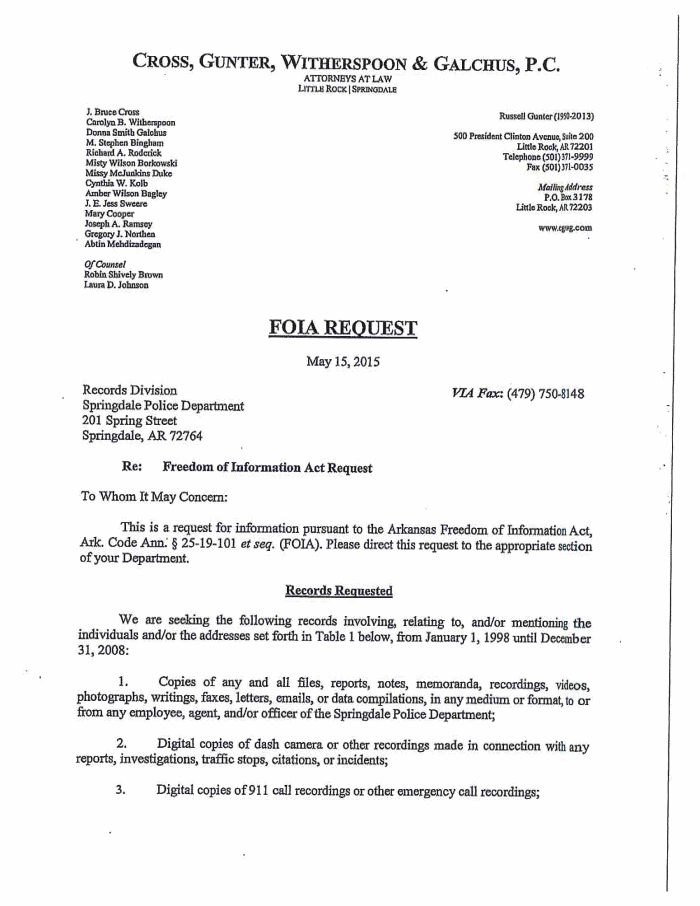
The release of police investigative documents related to the Duggar family was “absolutely” legal, an Arkansas attorney said, despite what was insinuated during a Fox News segment that aired Wednesday.
Several times during the interview, Jim Bob and Michelle Duggar — as well as Fox News’ Megyn Kelly — said the documents were released illegally.
“It’s been an unprecedented attack on our family,” Jim Bob Duggar told Kelly, adding that the family is considering legal recourse. “I wonder why all this press isn’t going after the release of these juvenile records.”
On May 15, the Springdale Police Department released an offense report to In Touch magazine dating back to December 2006. At the time the report was filed, Josh Duggar was 18.
In the report, in which names of juveniles were redacted, officers recounted their investigation of potential “forcible fondling” several years earlier in the Duggar home.
The report confirmed rumors that had been circulating for years online and within the Duggar reality TV fan community — that as a teen, Josh Duggar had inappropriately touched several young girls, including his sisters. After the In Touch story published, Josh Duggar apologized and stepped down from his position with the Family Research Council. TLC also stopped airing reruns of 19 Kids and Counting.
Arkansas state law does protect juvenile records within family court, as well as those related to child maltreatment investigations by the Division of Children and Family Services.
But as for the report from the Springdale Police Department?
“There was nothing illegal about a [Freedom of Information release] of a document in possession of Springdale police,” attorney John Tull said. “They were just following the law.”
Under Arkansas’ Freedom of Information Act, documents belonging to agencies are considered public unless they are specifically identified as exempt. Examples of exempt documents include medical records, grand jury minutes, and state income tax records. In 1992, the state Supreme Court also clarified that while juvenile court records may not be disclosed, other records that identify juveniles who are not charged with crimes remain public.
On May 15 — the day the Springdale Police report was accessed for In Touch — a Little Rock law firm had sent the department a sweeping request for all files, recordings, videos, audio, and other reports related to Michelle Duggar, Jim Bob Duggar, and Josh Duggar, as well as 17 addresses associated with the family.
In Touch published an article based on the report on May 19, setting off a media frenzy. Two days later, a judge ordered police to destroy the 2006 report, arguing that one of the victims is still a minor and could be identified by the document.
Typically, police reports are kept indefinitely. But Tull said state law gives judges the power to seal juvenile court records or order them destroyed if the offender reaches age 21 and is not expected to face any criminal charges as an adult.
However, Tull said he has never heard of an instance in which a judge ordered the destruction of documents belonging to an agency outside of the court system, nor was he aware of any judicial authority to do so.

Authorities became involved with the Duggar family 3 ½ years after, according to his parents, Josh Duggar revealed that he had inappropriately touched five girls. Police investigated, but the statute of limitations had lapsed and no criminal charges were filed.
In cases of child maltreatment, however, a second, civil investigation by the Division of Children and Family Services takes place in tandem.
“There are essentially two different processes,” said Amy Webb, a spokeswoman for the state Department of Human Services.
In 2007, a Northwest Arkansas Times reporter stumbled upon a Washington County Circuit Court file, Josh Duggar vs. the Arkansas Department of Human Services. The sealed case was mistakenly left in a stack of routine filings in a clerk’s office, but the only information the reporter saw is that a trial in the case took place Aug. 6, 2007.
Webb said she could not confirm or deny whether the agency had been involved with the Duggar family. But in any child maltreatment investigation, she said, investigators begin with a safety assessment. All relevant people are interviewed, which can include the children, the alleged perpetrator, neighbors, or teachers.
“Ultimately, we will either determine an allegation to be true or unsubstantiated,” Webb said.
In severe cases, children are removed from the home, and the criminal process can begin. Or, "it could not rise to that level, and we would just work with the family,” Webb said.
Jim Bob and Michelle Duggar have said their son and the girls received professional counseling, though they did not specify when, or if it was ordered by a court.
Generally, a family judge will get involved following a child maltreatment investigation to order appropriate treatment and follow-up measures. A perpetrator may also be added to a confidential registry that is available to schools and nursing homes as they perform background checks. A person on the registry may later be able to appeal to a court for their removal, Webb said.
Throughout the court proceedings, any children are represented by their own lawyer independently of other family members, she added.
“They help give the victim a voice,” Webb said.
BuzzFeed reporters Salvador Hernandez and Emily Orley contributed to this report.

